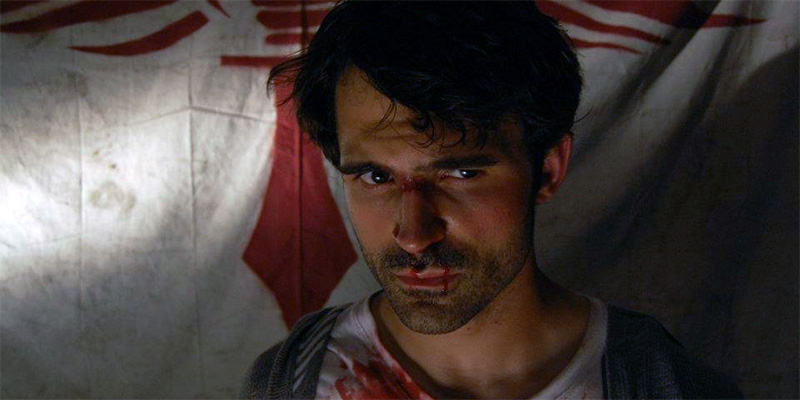Here at Far East Films we’re huge fans of Eric Jacobus and The Stunt People. We’ve spent many an hour watching and waxing lyrical about their amazing action shorts.
Packed full of top notch fight choreography and ingenious comedy routines, their efforts come about as close to the Hong Kong action classics of yesteryear as you can possibly imagine. If however, by some weird twist of fate you are yet to see any of their work then do yourself a favour and head on over to www.thestuntpeople.com to see what you’ve been missing!
Right, now that everybody has caught up let’s get onto Eric’s eagerly anticipated new feature-length outing arriving in June. Entitled ‘Death Grip‘, the film sees him playing a man forced to fight for his life after his brother becomes wrapped up in the dark world of a murderous satanic cult. We thought we’d use this as an excuse to get in touch with Eric so that we could learn a little more about the movie as well as discuss some of his past work.
Far East Films: For anyone not familiar with yourself or your work, can you tell us a little about Eric Jacobus and The Stunt People?
Eric Jacobus: I run an independent action filmmaking group called The Stunt People in the San Francisco Bay Area, CA. Way back in high school, I was on a very different path, going for a physics degree while working as a computer programmer at my college – a nerd if there ever was one. But then one night, I happened to catch the finale of Jackie Chan‘s ‘Police Story‘ on TV, and I decided I wanted to drop Physics and try my hand at making my own action films. I started The Stunt People with Chelsea Steffensen and Ben Brown in 2001. Ben had a camera, I programmed the website and forum and could figure out the editing, and Chelsea knew martial arts, so we had everything we needed to make an action film. But our mission hasn’t been just to make Hong Kong-style movies. We want to make American films with killer action, and we look to Hong Kong’s more formalized camerawork and editing to make that a reality.
Today The Stunt People are a group of over thirty skilled stuntmen and women who bring a wide range of skills to the action film genre, from various martial art styles to parkour, acrobatics, tricking, and stunt falls. We’ve filmed over a hundred short films and worked on a dozen feature films, from major productions like ‘Love Aaj Kal’ (2009) and Discovery Channel’s ‘Time Warp’ to our own films like ‘Contour‘ (2006) and ‘Death Grip’ (2012). We’ve also inspired dozens of stunt crews around the world to try their hand at making their own action films. It’s been my dream to make quality independent action films, and with The Stunt People I’ve have been on the cutting edge of that.
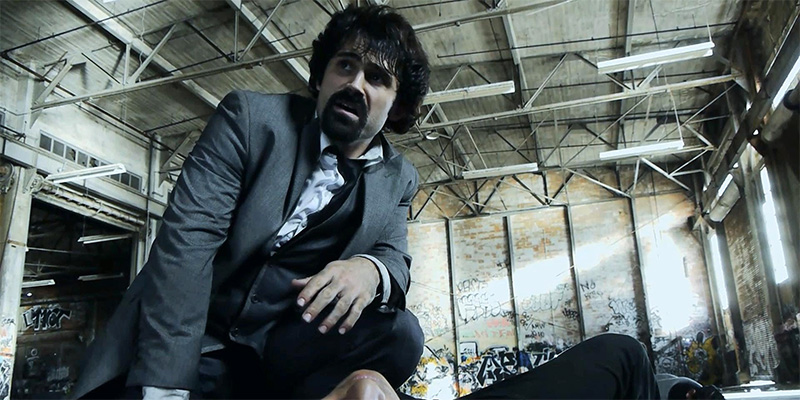
FEF: I’ve always felt you have a fantastic eye for crafting out action sequences. Somehow you manage to make them both physically impressive and exciting. Would you say that this is something that came naturally, or have you fine tuned your style over the years?
EJ: It definitely didn’t come easily. I did have an eye for the technique early on, so I could choreograph in the “Hong Kong-style” even before I started martial arts at the age of twenty. But after learning how to do proper martial arts from a technical standpoint, a choreographer has only accomplished a small fraction of his job. The major task is translating martial arts into a fight scene. I like to say my job is less about choreographing, and more about translating. Most of the handwork and footwork I come up with has no real-world application. It’s all for the camera. Then I’m able to look at it, tweak it, make it sell.
But I’d say that the most important part is bringing out the human element. If an action scene is only about martial arts, you’re only selling yourself to that small fraction of the world that understands martial arts. What made Jackie Chan stand out was that everybody could enjoy his material. When the performers have real motivation driving them, and the fight scene itself has a story arc, then you’ve got a winner. I avoid working on productions that don’t give me this kind of control, since the fight just falls apart without all these elements. With each project I realize how critical this human element is, and it makes the fight both physically and emotionally exciting.
FEF: What fight scenes or stunt sequences have acted as an inspiration to you?
EJ: I’ve been inspired by anything Jackie Chan’s done, since I feel I resemble him the most of all my idols. He’s not agile enough to slip out of encounters like Yuen Biao, but not big enough to be a physical force like Sammo Hung, who always punctuates his scenes with powerful moves. So Jackie uses his head to win fights, which makes him universally appealing.
The American action films of the 80s, mostly the Schwarzenegger ones, were the epitome of American action. The entire production revolved around the action, which was shot in a way that was easy to follow. It was as if the clearer and bigger the action, the better.
Beat Takeshi is also a brilliant action star who’s also a minimalist. It takes a genius to be an action star at the age of 60 and rarely throw a punch. A lot of what he does is off-camera, which shows respect for the audience. He trusts them to get it, and they do. I take inspiration from each one of these icons.
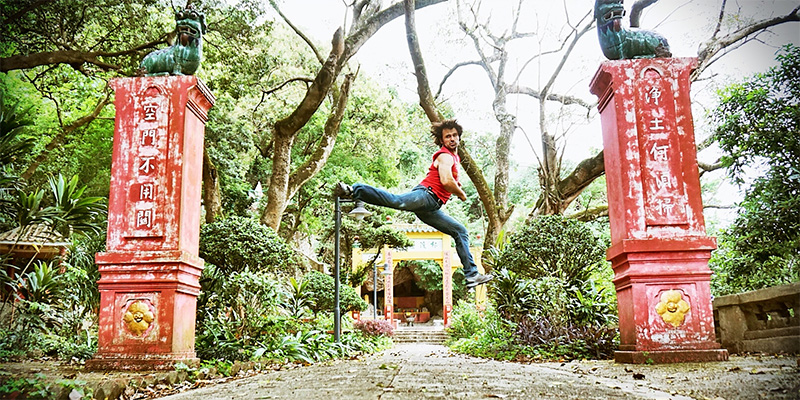
FEF: Your first full length feature film, ‘Contour’ was great fun and the action certainly surpassed the majority of big budget Hollywood outings. What would you say are your main memories of making the film, and is there anything you would have liked to do differently?
EJ: ‘Contour’ was a blast to make, if only because it was such a long trial. A lot of my time between shoots was spent trying to make ends meet or figuring where to sleep that night, since I didn’t have a job. I’d carry my laptop, camera, and hard drive everywhere so I could plop down on someone’s floor and edit what we shot that day. It felt rough at the time, but oddly enough I treasure those moments the most. It gives good context whenever the going gets tough. Aside from that, bonding with the cast and crew was invaluable, and they became my brothers from then on. Even though some of us haven’t seen each other in years, it’s easy to reconnect, like we’ve been through a war together.
‘Contour’ had its share of flaws. The acting was goofy, the story was hastily thrown together two weeks before shooting (often during shooting too!), but I made ‘Contour’ for one reason: I saw that action films weren’t being made well in 2005, and I wanted to prove that someone could do the job for $5,000. And we did it. Despite some negative reviews, I wouldn’t change anything. It was a learning experience that made me who I am today.
FEF: What would you say are the biggest challenges you face as an independent film-maker?
EJ: Getting money and name talent have definitely been the greatest challenges. Everything else comes easily by comparison, but those two are the hardest, especially since they tend to depend on one another. Without one, it’s hard to get the other, so you have to be smart and play the balancing act. Everyone faces this same struggle. It’s all just a lot of hard work, there’s no magic ticket. Don’t ever listen to anyone who says, “I can make ya a lot of money, kid.” The truth is you just have to put in the work.
Besides, I treasure the hard work! It’s the most memorable part! You wouldn’t be interviewing me if I were an overnight success!
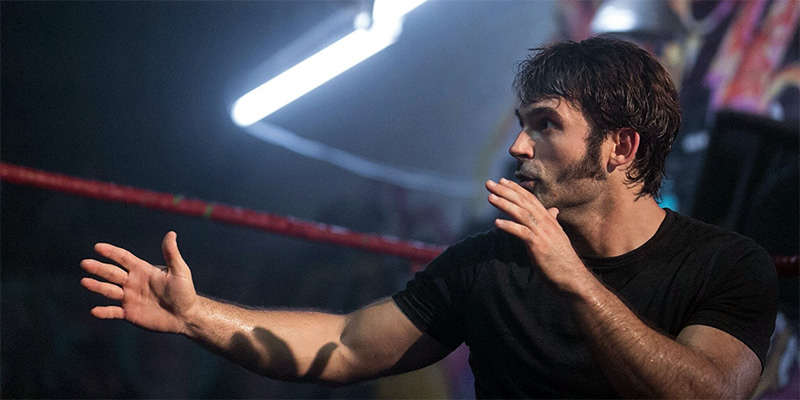
FEF: What’s the motivation to risk your life/health in independent action films? Does it annoy you that the genre is still looked down upon, despite the best efforts of those involved?
EJ: I’m motivated by the surprising absence of quality independent action in the market. Independent martial art films just don’t get made, and there are two reasons for this. First, they’re expensive to make, and indie filmmakers would rather shoot a drama for a tenth of the cost, or they shortchange themselves on the action and resort to cheap tricks that give the genre its negative reputation. Second, as a stuntman or choreographer trying to find work, it eventually becomes a decision of whether to move to Hollywood. This is an absolutely valid decision. I have all the respect in the world for people like J.J. Perry and Chad Shahelski who are bringing the best game to the big budget action market that we could ever hope for. The market needs them as well as all the stuntmen and women who break their backs to entertain us. I choose to stick it out as an independent filmmaker because that’s the demand I’m targeting. As more people target it with me by bringing quality action to the viewer, we’ll bring more legitimacy to the market and people will take the genre more seriously.
FEF: Have you ever received any serious offers to work on a big Hollywood production?
EJ: People have offered, and I always take the offer seriously, but nothing has been quite right for me. In all the times I’ve had offers, it’s never been the right fit. I’ve not found an instance where I could really use my skills and vision effectively on a production. The Hollywood system just works differently, and it’s massive and slow to change. So as an independent player, much like a start-up business, I’m able to stay agile and innovate more easily than the big guys.
FEF: Tell us about ‘Death Grip’? What themes are you keen to tackle?
EJ: ‘Death Grip’ is my second feature film. It’s about ex-criminal Kenny Zemacus who decides to clean up his life. He starts by taking custody of his autistic brother Mark, but when he takes Mark on a last-minute catering gig at a museum, Mark unwittingly involves them in a murderous satanic cult and their dangerous plot to steal the museum’s showpiece — the silver Coin of Judas. When the cult kidnaps Mark, and the coin with him, Kenny has to chase them down to save his brother and clear their names, ultimately bridging the gap that’s existed between them their whole lives.
It’s a story of Kenny’s battle between innocence and desecration, loss and forgiveness. The conflict between Kenny and Mark manifests itself in the tone of the film. We went for more graphic violence this time, but still kept some dark humor, creating a contrast that highlights the mismatched relationship of the two brothers. And it’s this relationship that drives all the other themes and conflicts in the film, and gives it its depth.
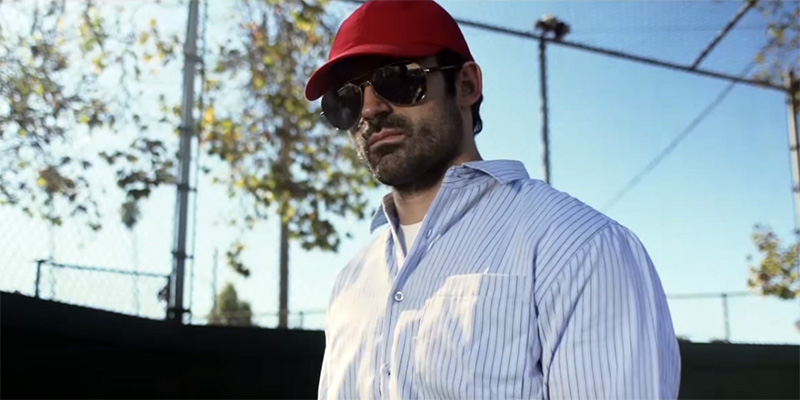
FEF: Comedy often seems to play a big part in a lot of your projects but the trailer for ‘Death Grip’ indicates that this is a slightly more serious affair. Was this a deliberate switch in style?
EJ: ‘Death Grip’ started out as a straight action-comedy, but we decided to add in some more serious elements. Kenny’s character got grittier, his background became more shrouded in mystery, and he resorted to more violent means to win fights. There’s still humor, though. An autistic brother like Mark acts as a sort of pie-in-your-face, making us feel like we take life too seriously sometimes. With the context of Kenny and Mark’s relationship, we can switch between grim reality and comedy in a more natural way, and we use that clash in the fight scenes.
We also knew that from a market perspective it made more business sense to do an action thriller. Action comedies can tend to be very “local”, and therefore hard to sell at a low budget level internationally. So we made our comedy less off-the-wall and more physical, so it would translate better for non-English speakers.
FEF: Johnny Yong Bosch of ‘Power Rangers’ and ‘Broken Path’ fame is amongst the cast for ‘Death Grip’, how did that come about?
EJ: I met Johnny at Comic-Con in 2008 and related my experience working on ‘Contour’ to his experiences working on ‘Extreme Heist‘ and ‘Broken Path‘. I gave him a copy of Contour and we exchanged emails for a while. When we were looking for someone to play the villain Torch, we thought Johnny would be a perfect fit. So I tried to figure out how to ask him, thinking there was some proper way to do this. After over-thinking it for some time, I just emailed him and asked, and he responded with an enthusiastic, “Let’s do it!”
We honestly couldn’t have picked a better person for the role, and for our team. Johnny speaks that same “language” that we use as indie action guys and also understands our production method. So it was very natural working with him and made the production that much better as a result.
FEF: What can we expect in terms of action for ‘Death Grip’? Have you aimed for any specific style?
EJ: ‘Death Grip’ is superior to ‘Contour’ on a technical level, since we’ve grown as a team and in the variety of styles we now use. We have a knife fight, a 15-on-1 fight, a fight in the dark, and a fight where we destroy a bathroom. We played with mixed martial arts, added some Hapkido throws, some long takes, and still maintained the Hong Kong style.
But the main goal in making ‘Death Grip’ was creating a good story that people would care about, and then implementing fight scenes that meshed seamlessly with that story. The audience won’t just be watching the fight. These fights will draw them inside Kenny’s head to connect with his motivation and feel the energy of the fight itself. And we did this in some pretty cool ways. Each action scene has its own human element in it, something special that will connect with audiences in a way that I frankly don’t see done very often. I think this sets ‘Death Grip’ apart from other action material that’s out there right now.
FEF: For those of us not based in the U.S., how will we be able to see ‘Death Grip’?
EJ: We’ll release the DVD and Blu Ray in July, which will be available on www.thestuntpeople.com.
FEF: What’s next for yourself and the team?
EJ: We’re pushing to get the next film going, this time with a bigger budget and some more name cast. We actually have four concepts that we’re developing right now, each with a really strong story and its own unique element that sets it apart from your everyday action film. These aren’t just guys trading blows. There will be something special about every action scene and every character. In the over-saturated indie film market, this is how we plan to stand out.
‘Death Grip’ is available on DVD and Blu-ray now from stuntpeoplestore.bigcartel.com and you can read the FEF review here.
Far East Films would like to thank Eric Jacobus for taking the time to speak with us.
- Theatrical release: ‘July Rhapsody’ - April 20, 2024
- Trailer: ‘Buzzy Noise’ - April 20, 2024
- Blu-ray & DVD release: ‘The Goldfinger’ - April 20, 2024

